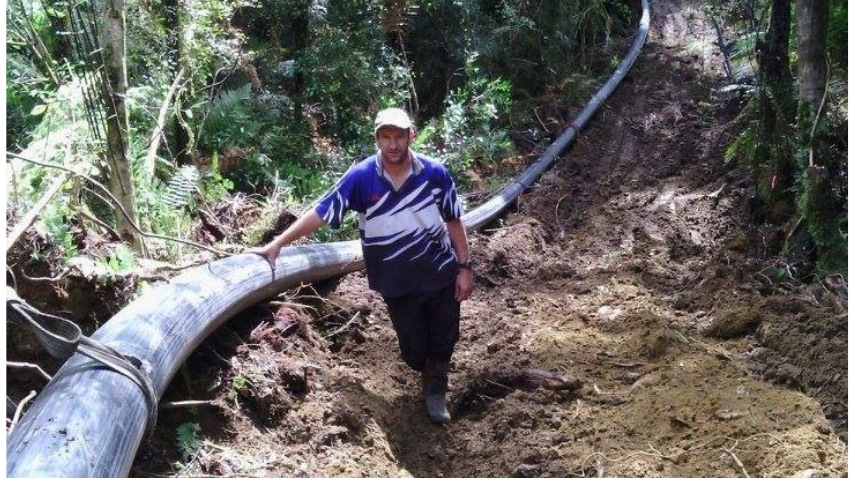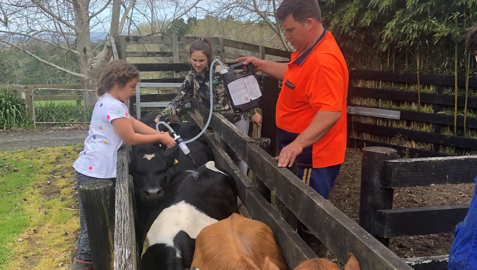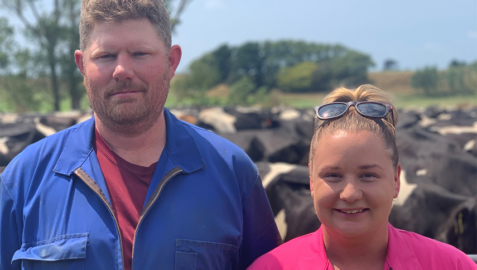
Getting off farm’s important
Module Overview
Dairy farmer Graham Berry milks 240 cows on a 145-hectare West Coast farm near Franz Josef. Farmstrong caught up with him to get his thoughts on living well to farm well.
You’ve been farming a long time. Tell us about your operation.
We’ve been here 17 years. We milk 240 cows, we’ve got some yearlings on, calves and a few beefies.
How’d you get into farming?
I was bought up on a sheep and beef farm in Atarau up the Grey valley. Then when I left school I went and worked on the neighbour’s dairy farm.
What do you like about dairy farming?
I like working outside and the fact you get to do a bit of everything. You’re always multitasking. How I feel about it on any given day depends on things like the weather, but every job has its perks and downfalls. I just enjoy getting outdoors amongst the cattle. They don’t argue back … unless they kick you!
You’re heavily involved in your local community too, aren’t you?
I was on the Franz Josef Community Council for a number of years and I’ve been part of Civil Defence here for the past seven or eight years. I’m also chair of SERF (South Westland Emergency Relief Trust for Families) working with families from Ross down to Haast. We’ve been busy helping people who’ve lost jobs due to the impact of Covid on tourism in this area or people that are just having a bad run and not a yarn.
Why do you put your hand up for these things?
I enjoy getting off farm and connecting with other people. This is a one-person farm. I get staff in to help me through spring and use relief milkers, but I’m mostly here by myself all day so getting off farm is important. I also find it rewarding to be able to contribute my skills to the community. I was raised in the Grey valley where people always dropped what they were doing to help each other.
You coach sport too, don’t you?
Yes, I used to play rugby and rugby league, actually anything sport I would give it a go. Now I coach some South Westland rugby and over the last seven years I’ve really got into coaching kids’ badminton. I’ve played badminton for most of my life. I regularly head away to tournaments and training camps for kids that get selected for the Mainland Team.
That’s another big commitment.
Yes, but it just gives you that wee break from the farm which is important. It’s good for the brain, it’s good for your mental health and wellbeing. The reward I get from the doing the coaching, seeing the kids grow as people, is also huge. And the friendships I’ve made with other coaches around the mainland and NZ have been great too. They’ve kept me learning. One of my mottos in life is that I want to keep learning. Learning keeps you fresh.
Has that philosophy carried over into your farming?
Definitely. For example, in 2015 we built our own hydro power system here and set up a 55 kilowatt power scheme on farm. It runs the farm and any power we don’t use, we sell back to the grid. That was a really cool project.
How do you manage the workload on farm?
This size farm is a bit more than a one-person job and not really a two person, so I shifted to milking once a day, two years ago. That seems to work nicely and allows me to do the other things.
The to-do list on a farm can be endless. How do you prevent burnout?
That’s where the sport comes in handy for me. Farming can be isolating and tough going at times. The pay outs are reasonable at the moment, but I remember some harsher times too. You also have those days when things just go wrong. I always just stop, breathe in, breathe out and remember that things are never that bad. There’s always people worse off.
It can be hard to keep that perspective when you’re working alone though, can’t it?
That’s why rural communities need to look after each other, whether it’s sport or organizing a barbecue or a pot luck dinner, or dropping in on a mate who’s struggling and putting on a brew. Anything that gets people out and meeting others is a good thing. The community here is amazing. There are some great farming families here who are happy to help. There’s no need to struggle on alone.
What are your go-tos?
If I’m feeling frustrated, I make sure I get away from the farm and do something social whether it’s badminton, or just going down the local pub for an ale and a yak. That’s my get out of jail free card. You need to make that effort to get off farm.
Do you think attitudes are changing to looking after yourself on farm?
Yes I think they are. It is still possible in farming to get up at five in the morning and work til ten at night, but what’s the point of working like that? If you have a more balanced lifestyle, you’re going to be a lot more productive and effective when you are farming. It’s about having a plan for what you want to achieve each week and being realistic. Rome wasn’t built in a day.
Everyone has days on farm when nothing seems to go right. Any advice?
If I’m having a shit day and feeling overwhelmed, I just go and have a twenty-minute nana nap to reset. That makes a hell of a difference. You wake up a different person and get things done much more quickly afterwards. It just clears the mind and gives you a chance to think, is there an easier way to do this job?
What advice would you offer someone starting out?
The best thing I did when I was young was work on four different farms for a season each. I just learnt so much off other people. All the bosses were different and each of them taught me a lot. It’s like badminton coaching. There’s always something you can learn from another coach. I learnt early on how some of farmers still kept involved in their sport and did other things as well as farm.
That’s the best thing about farming – we all have the same goals, but everyone farms differently. It’s about finding out what works for you and putting your own spin on things. If you just listen, learn and really go for it, it’s still a bloody good industry to be involved in.
Farmstrong is a nationwide, rural wellbeing programme that helps farmers and their families cope with the ups and downs of farming. To find out what works for you, check out farmstrong.co.nz



